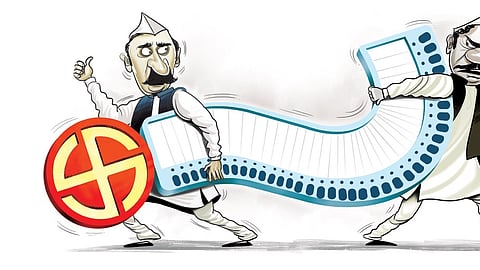

CHENNAI: Even though the ‘None of the above’ (NOTA) option, introduced in 2013, initially received a significant response from voters as it allowed them to not choose any of the candidates contesting in a particular election, the number of people opting for this option is dwindling with every election, raising the question of whether NOTA is losing its sheen.
NOTA was added to Electronic Voting Machines (EVM) in 2013 after a Supreme Court verdict. During the 2011 Assembly elections in Tamil Nadu, nearly 24,591 voters opted for the 49-O option (zero vote or negative vote) to declare that they did not support any of the candidates in the fray. In the 2009 Lok Sabha elections, 18,162 voters opted for zero vote.
After the top court’s verdict, the NOTA option was introduced in Tamil Nadu for the first time during the Yercaud by-election in 2013.
In the 2014 Lok Sabha elections, NOTA received an overwhelming response, with a whopping 5.7 lakh voters opting for NOTA in Tamil Nadu. In the Nilgiris constituency, nearly 46,559 opted for NOTA. The number of voters who opted for NOTA was more than the votes polled by smaller parties during this election. During the 2016 Assembly elections, NOTA polled 5.61 lakh votes (1.3%).
During the 2019 Lok Sabha elections in Tamil Nadu, 5.47 lakh (1.27%) voters opted for NOTA. In the 2021 Assembly elections, this number came down to 3.45 lakh (0.75%).
When asked about the relevance of NOTA, and whether it is losing its sheen by the year, State Coordinator of the Association for Democratic Reforms (ADR), P Joseph Victor Raj said NOTA, often referred to as a ‘toothless tiger,’ fails to make any direct impact on election results. Its primary function is to serve as a platform to express dissent or frustration, allowing voters to signal their disapproval of political parties.
“The purpose of introducing NOTA was to discourage political parties from fielding candidates with questionable backgrounds. However, it did not have any impact. In 2009, the number of candidates with pending criminal cases was 30%. In 2019, many years after NOTA was introduced, this figure rose to 43%,” Raj said.
“Candidates who lose against NOTA should be barred from contesting again. Implementing such a rule would give NOTA more significance during the elections,” he added.
Sharing similar views, social activist and anti-corruption NGO Arappor Iyakkam’s convener Jayaram Venkatesan said NOTA should continue as an option for voters to register their discontent about the candidates in the fray. “NOTA votes should have some value. When NOTA gets the highest votes, all candidates in that particular constituency should be treated as losers in that election. Also, when a by-election takes place in that constituency where NOTA got the most votes, a fresh set of candidates should contest, and the old candidates defeated by NOTA should not be allowed to contest again. This is because a majority of people have already rejected them,” he added.
As of now, some people feel there is no use picking NOTA. The Election Commission of India (ECI) should move towards this kind of reform so that NOTA’s purpose will be served, said Venkatesan, adding that after his representations, the State Election Commission agreed to include NOTA in EVMs used for local body elections in April 2022.
Opining that NOTA should continue as an option, veteran journalist Tharasu Shyam said, “In the past, voters who did not prefer any of the contesting candidates used to mark their vote on more than one symbol. Voters also used to drop the ballot paper without marking their vote for anyone. But that is treated as an invalid vote. Later, option 49-O was introduced to enable voters to express their displeasure over the candidates. However, there was no secrecy for that option. Among all these, NOTA is the best option, and it should continue.”